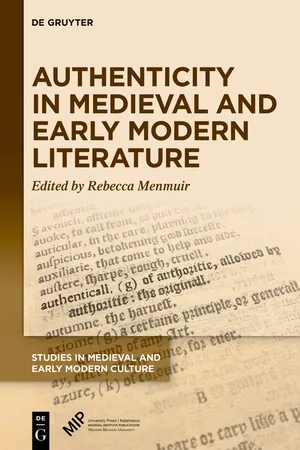
- English
- ePUB (mobile friendly)
- Available on iOS & Android
Authenticity in Medieval and Early Modern Literature
About this book
What does it mean to be authentic? The term is as pervasive today as it is difficult to define. To be 'authentic' in the Middle Ages or Early Modernity was no less of a complex task, albeit framed in ways different to today's concept of authenticity as an individualistic or capitalistic venture (think 'being true to oneself' or 'brand authenticity').
This volume examines a range of medieval and early modern approaches to authenticity in literature, asking how authenticity was defined, privileged, constructed, and contested in the periods covered.
Essays trace the shifting status of authenticity across four literary categories which most test the concept of premodern authenticity: forgeries, histories, translations, and continuations. Contributions engage with works across Latin, Greek, English, French, and Irish, and set authenticity in conversation with medieval and modern perspectives on authority, truth, and morality.
Frequently asked questions
- Essential is ideal for learners and professionals who enjoy exploring a wide range of subjects. Access the Essential Library with 800,000+ trusted titles and best-sellers across business, personal growth, and the humanities. Includes unlimited reading time and Standard Read Aloud voice.
- Complete: Perfect for advanced learners and researchers needing full, unrestricted access. Unlock 1.4M+ books across hundreds of subjects, including academic and specialized titles. The Complete Plan also includes advanced features like Premium Read Aloud and Research Assistant.
Please note we cannot support devices running on iOS 13 and Android 7 or earlier. Learn more about using the app.
Information
Table of contents
- Title Page
- Copyright
- Contents
- Part I: Definitions and Distinctions
- Part II: Forging Authenticity
- Part III: Histories
- Part IV: Translations
- Part V: Continuations and Canon-Formation
- Index